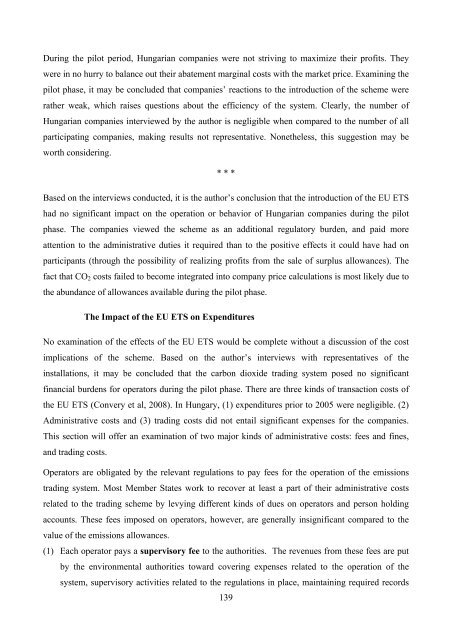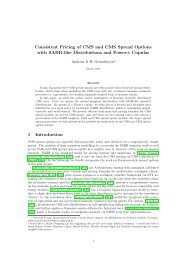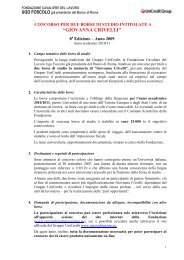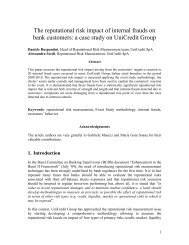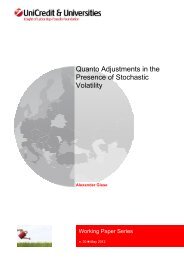Dóra Fazekas Carbon Market Implications for new EU - UniCredit ...
Dóra Fazekas Carbon Market Implications for new EU - UniCredit ...
Dóra Fazekas Carbon Market Implications for new EU - UniCredit ...
You also want an ePaper? Increase the reach of your titles
YUMPU automatically turns print PDFs into web optimized ePapers that Google loves.
During the pilot period, Hungarian companies were not striving to maximize their profits. They<br />
were in no hurry to balance out their abatement marginal costs with the market price. Examining the<br />
pilot phase, it may be concluded that companies’ reactions to the introduction of the scheme were<br />
rather weak, which raises questions about the efficiency of the system. Clearly, the number of<br />
Hungarian companies interviewed by the author is negligible when compared to the number of all<br />
participating companies, making results not representative. Nonetheless, this suggestion may be<br />
worth considering.<br />
* * *<br />
Based on the interviews conducted, it is the author’s conclusion that the introduction of the <strong>EU</strong> ETS<br />
had no significant impact on the operation or behavior of Hungarian companies during the pilot<br />
phase. The companies viewed the scheme as an additional regulatory burden, and paid more<br />
attention to the administrative duties it required than to the positive effects it could have had on<br />
participants (through the possibility of realizing profits from the sale of surplus allowances). The<br />
fact that CO2 costs failed to become integrated into company price calculations is most likely due to<br />
the abundance of allowances available during the pilot phase.<br />
The Impact of the <strong>EU</strong> ETS on Expenditures<br />
No examination of the effects of the <strong>EU</strong> ETS would be complete without a discussion of the cost<br />
implications of the scheme. Based on the author’s interviews with representatives of the<br />
installations, it may be concluded that the carbon dioxide trading system posed no significant<br />
financial burdens <strong>for</strong> operators during the pilot phase. There are three kinds of transaction costs of<br />
the <strong>EU</strong> ETS (Convery et al, 2008). In Hungary, (1) expenditures prior to 2005 were negligible. (2)<br />
Administrative costs and (3) trading costs did not entail significant expenses <strong>for</strong> the companies.<br />
This section will offer an examination of two major kinds of administrative costs: fees and fines,<br />
and trading costs.<br />
Operators are obligated by the relevant regulations to pay fees <strong>for</strong> the operation of the emissions<br />
trading system. Most Member States work to recover at least a part of their administrative costs<br />
related to the trading scheme by levying different kinds of dues on operators and person holding<br />
accounts. These fees imposed on operators, however, are generally insignificant compared to the<br />
value of the emissions allowances.<br />
(1) Each operator pays a supervisory fee to the authorities. The revenues from these fees are put<br />
by the environmental authorities toward covering expenses related to the operation of the<br />
system, supervisory activities related to the regulations in place, maintaining required records<br />
139


